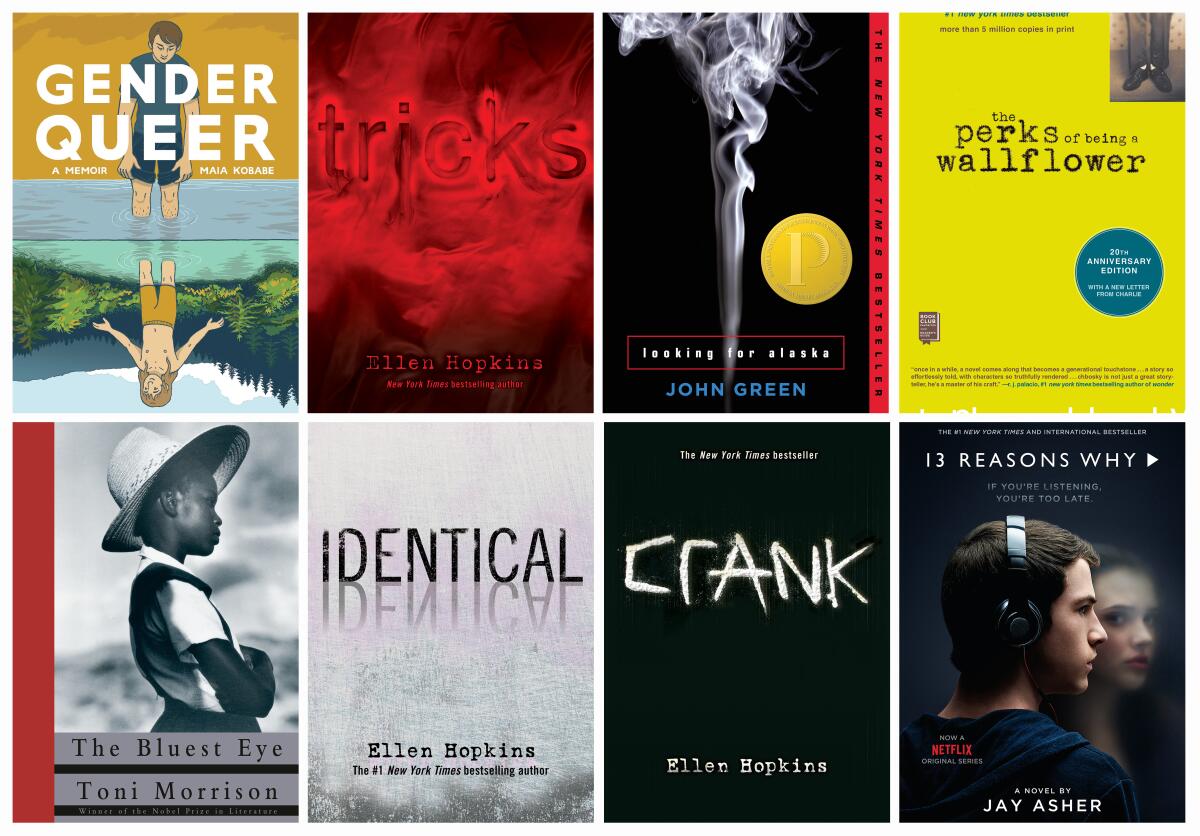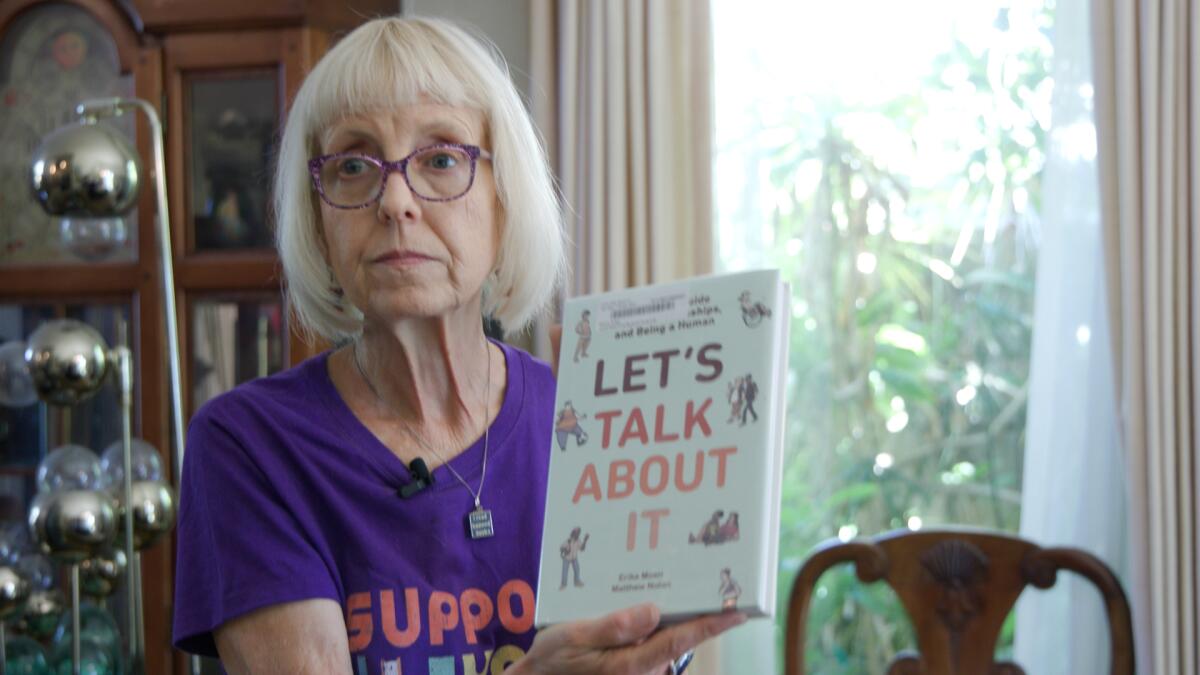How school book bans exploded — with front lines in Southern California too

Good morning, and welcome to the L.A. Times Book Club newsletter.
As the new school year begins, books, literacy and freedom of expression are under assault as never before, with book bans at U.S. schools up a whopping 33% since just last year.
“More kids are losing access to books, more libraries are taking authors off the shelves, and opponents of free expression are pushing harder than ever to exert their power over students as a whole,” says Suzanne Nossel, chief executive of PEN America, which released its latest book ban report Thursday.
With most of the attention focused on states such as Florida and Texas, you might have missed the front lines flaring in California too.
Retired Huntington Beach librarian Barbara Richardson said she is upset about her city council using child safety arguments to restrict access to books. “I think they’re afraid that if a teen reads a book that talks about sexual activity they’re going to become sexually active, or if they read a book about LGBTQ that maybe they themselves will become gay,” she says.
“As a librarian, having worked in the city for 32 years and since I’ve retired, I have never, not once, had anyone come up to me and say, ‘You know what, my child’s life was ruined because of a book they checked out of the library.’ It didn’t start in Huntington Beach and I’m really sad it’s come here.”
L.A. Times Studio senior producer Karen Foshay spoke with Richardson for “Hear Me Out,” a video series based on letters to the editor. This segment also includes comments from Huntington Beach City Council members explaining their reasons. You’ll want to watch it now.

Q&A: What’s next
To follow up on the new book ban report, I reached out to Allison Lee, Los Angeles director of PEN America, a nonprofit organization dedicated to protecting free expression worldwide. Lee talked about the issues involved, what’s going on in California, and how lawmakers and others often try to pretend they’re not banning books.
Where are the most book bans? The top five states with bans include Florida, Texas, Missouri, Utah and Pennsylvania. Over 40% of all book bans occurred in Florida alone (1,406 bans). This year’s top banned books were predominantly young-adult titles featuring women, queer and/or nonbinary protagonists. Of particular concern is that books concerning difficult topics — violence and abuse, health and well-being, and sexual experiences — were the most targeted during the 2022-2023 school year. And books about the experiences of marginalized identities continue to be targeted. Many stories feature difficult topics. You’d be hard-pressed to find or write a book without these topics. These stories often mirror the real-life experiences of young people navigating an increasingly complex world as they move from childhood to adulthood.
What are you seeing here in L.A. and California? Gov. Gavin Newsom is leading efforts to position California as a state which champions free expression and defends the right to read and to learn. AB1078, a Newsom-backed bill, recently passed the state Assembly, and is expected to be signed in the coming weeks. This legislation will fine school districts for rejecting textbooks or school library books for discriminatory reasons. While California is largely considered a blue state, book banning is a hyper-local issue, and the power local school boards or city councils have to determine policies around book challenges, restrictions and removals cannot be underestimated, as evidenced in the Temecula Valley School Board’s rejection of textbooks which mention Harvey Milk, and the Huntington Beach City Council’s vote to restrict access to certain books they deem “pornographic” in the city’s libraries.
Are you seeing places trying to veil efforts to restrict access to books? Critics suggest that books are not being banned, they are simply being removed from general circulation pending investigation. PEN America argues that diminished access IS censorship because: The gap of time between initial challenge and decisions ranges from a day to over a year. There are hundreds of books right now in a “limbo” state — “banned pending review” — these are books that were picked by professionals to be a part of the educational environment and they have been removed for no other reason other than someone might disagree with their contents.
Others argue that books are just being moved to a different, “more appropriate” section of a library. This was true for Amanda Gorman’s book “The Hill We Climb,” which was challenged in the Miami Lakes school district in Florida and subsequently restricted for access based on a student’s age, reading level and consent from parents. Sensible systems already exist to guide librarians and educators and families to work together for the best interest of the students. No parent ought to have the right to dictate or control what it is all children have the opportunity to read in schools.
School libraries may be the only place some students can access literature or information. Students may lack the funds to purchase books or may find themselves in a home environment that is not supportive or even safe.
What’s next for PEN in L.A.? Any upcoming forums readers, teachers and students can attend? Yes! Our NextGen Pen Initiative, which works to empower the next generation of free expression, advocates as a series of trainings throughout California this fall. Additionally we will be discussing book bans as part of the Building Bridges program at the Holocaust Museum of Los Angeles on Oct. 22. The event is free. We will also be participating in a panel discussion on book bans, censorship and citizenship at UC Irvine on Oct. 25. This event is also free.
Do you have a favorite banned book? “The Bluest Eye” by Toni Morrison. Analyzing Morrison’s work — including this title — first while in high school and then again while an undergraduate prepared me for how to engage as an adult in discussions around complex topics like race, privilege, identity, beauty and self-loathing. Now, quite simply, her work reminds me of the power of storytelling. The fact that it continues to be challenged and banned because of the raw realness of that storytelling is an important reminder to me as to why I’m engaged in this fight.
Banned Books Week
Oct. 1 is the start of the American Library Assn.’s annual Banned Books Week, chaired this year by actor and “Reading Rainbow” founder LeVar Burton, our May book club guest author who joined a packed house to discuss the state of banned books.
Burton calls out book bans in U.S. schools as “restrictive behavior” that is “antithetical to free speech and expression” and emphasizes the “chilling effect” the bans, often implemented at the local level, can have “on the broader creative field.”
This month Burton spearheaded an open letter, signed by Ariana Grande, Guillermo del Toro, Mark Ruffalo and many others, calling on Hollywood leaders to use their influence to oppose book bans.
On Oct. 4 Burton will headline a live virtual conversation on Instagram about censorship and advocacy. This year’s theme is Let Freedom Read. You’ll find more Banned Books Week gatherings and info here.
Tell us: Do you plan to participate in Banned Books Week? Send your comments to bookclub@latimes.com.
Book Club October
The start of Banned Books Week also is the date of our next in-person L.A. Times Book Club meetup with celebrated biographer Walter Isaacson, author of the new bestseller “Elon Musk,” the billionaire entrepreneur owner of Tesla, SpaceX and the social platform X (previously Twitter). “There’s a large percentage of this country that thinks he’s a villain,” Isaacson tells Margot Roosevelt in a new interview. “They hate him. And there’s, I think, an equally large percentage of people who are wide-eyed fans and think he walks on water.”
Join us at 2 p.m. Oct. 1 at the El Segundo Performing Arts Center. Get tickets.
In the final analysis, Isaacson says he considers Musk one of the three great innovators of our time. “Steve Jobs brings us into the era of the digital revolution with human-friendly computers and a thousand songs in our pocket, and smartphones. Jennifer Doudna brings us into the era of life sciences by showing us how to edit our DNA. And Musk is bringing us into a future of electric vehicles and space adventures — as well as blowing a few things up, including Twitter. But they’re each people who, 50 years from now, you’ll look back and say they’ve touched the surface of history and you can still feel the ripples.”

On Oct. 11, spend an evening with two of America’s most prominent journalists: former Washington Post editor Martin Baron will discuss his new book, “Collision of Power,” with L.A. Times Executive Editor Kevin Merida at USC. Baron previously was editor of the Boston Globe and a top editor at The Times during the height of Southern California’s 1990s newspaper wars in Orange County. Get tickets to join in person or virtually.
As we careen toward the 2024 presidential election, Baron’s book delves into the nature of power, accountability, the Post’s ownership under Amazon founder Jeff Bezos, the future of newspapers and the challenges of covering Donald Trump. Says Kirkus: “His memoir is testimony to the efforts of a devoted staff whose commitment is reflected in a motto created by the paper just one month into Trump’s presidency: ‘Democracy Dies in Darkness.’”
For fellow audiobook fans, “Collision of Power” is narrated by actor Liev Schreiber, who played Baron in the 2015 Oscar-winning movie “Spotlight.” The film brought to life the Boston Globe’s Pulitzer Prize-winning reports chronicling the Catholic Church’s cover-up of child sexual abuses by priests.
Keep reading
The threat to creativity and democracy. Eight authors talk with Harper’s Bazaar about how it feels to have their books banned. “I remind myself of the response of children who still have access to my poetry,” says inaugural poet Amanda Gorman.
Reviving classic mysteries. Columnist Mary McNamara and critic Justin Chang discuss why Agatha Christie still beguiles us, even if the films based on her books aren’t always killer.
Notes from a geology nerd. Reporter Corinne Purtill writes about her passion for rocks, nature and the book that unexpectedly changed her life in the L.A. Times Wild newsletter.
Worthy stand-ins (or even better options). TV’s top shows are on hold as strikes wear on. Novelist Ivy Pochoda shares 10 books as replacement therapy.
Be a mensch. If you enjoy our community book club, please sign on as a benefactor through the L.A. Times Community Fund; your contribution is tax-deductible and we’ll feature your name onscreen at book club meetups and online. The L.A. Times Book Club is a labor of love — so many of my colleagues from departments across The Times generously share their time and talents to create live conversations and turn our coverage into one-of-a-kind experiences for our readers. Here’s how to join us as a supporter. We also welcome volunteers for events; send an email to bookclub@latimes.com
Sign up for our Book Club newsletter
Get the latest news, events and more from the Los Angeles Times Book Club, and help us get L.A. reading and talking.
You may occasionally receive promotional content from the Los Angeles Times.




